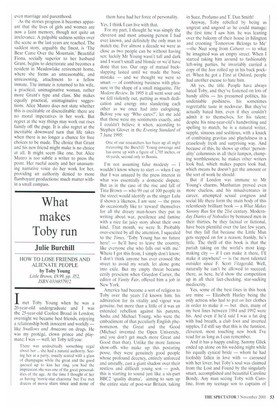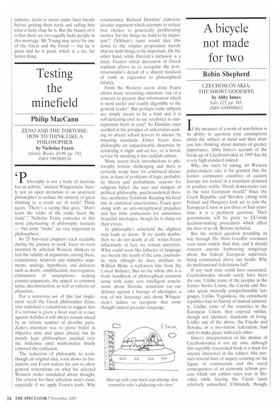What makes Toby run
Julie Burchill
HOW TO LOSE FRIENDS AND ALIENATE PEOPLE by Toby Young Little Brown, £9.99, pp. 352, ISBN 0316857912 Imet Toby Young when he was a 20-year-old undergraduate and I was the 25-year-old Coolest Broad in London; overnight we became best friends, enjoying a relationship both innocent and worldly — like Swallows and Amazons on drugs. He was my protégé, clown prince and playmate; I was — well, let Toby tell you: There was undoubtedly something regal about her ... she had a natural authority. Seeing her at a party, usually seated with a glass of champagne while the great and the good queued up to kiss her ring, you had the impression she was one of the great personalities of the age. At the time I thought of her as having 'movie-star charisma' but I've met dozens of movie stars since and none of
them have had her force of personality.
Yes. I think I can live with that.
For my part. I thought he was simply the cleverest and most amusing person I had ever known, and definitely the only man to match me. For almost a decade we were as close as two people can be without having sex; luckily Mr Young wasn't tall and dark and I wasn't small and blonde or we'd have done that too. Our orgy of mutual backslapping lasted until we made the basic mistake — and we thought we were so smart — of combining business with pleasure in the shape of a small magazine, The Modern Review. In 1995 it all went sour and we fell violently out, putting as much dedication and energy into slandering each other as we once had into eulogising. Before you say 'Who cares?', let me add that those were my sentiments exactly, and I couldn't believe it when, according to Stephen Glover in the Evening Standard of 7 June 1995:
One of our researchers has been up all night measuring the Burchill; Young coverage and has come up with a figure of 1,705 inches, or 48 yards. second only to Bosnia.
I'm not assuming false modesty — I wouldn't know where to start — when I say that I was amazed by the press interest in what was essentially a domestic dispute. But as in the case of the rise and fall of Tina Brown — who 99 out of 100 people in the street would identify as the singer Lulu if shown a likeness, I am sure — the press do occasionally like to 'reward' themselves for all the dreary man-hours they put in writing about war, pestilence and famine with a nice fat juicy story about their own kind. That month, we were It. Probably over-excited by all the attention, I squealed to the Times, 'Toby Young has no future here! — he'll have to leave the country, like everyone else who falls out with me.' Where I got this from, I simply don't know; I don't think anyone has ever crossed the street to avoid my wrath, let alone gone into exile. But my empty threat became eerily prescient when Graydon Carter, the editor of Vanity Fair, offered him a job in New York.
America had become a sort of religion to Toby over the years I'd known him; his admiration for its vitality and vigour was genuine, but more than a little of it was an extended rebellion against his parents, Sasha and Michael Young, who were the embodiment of that peculiarly English phenomenon, the Great and the Good (Michael invented the Open University, and you don't get much more Great and Good than that). Unlike the more famous show-offs who make up this posturing posse, they were genuinely good people whose profound decency, entirely unforced and unstuffy, cast a giant shadow over their restless and difficult young son — gosh, this is starting to sound just like a six-part BBC2 'quality drama', aiming to sum up the entire state of post-war Britain, taking
in Suez, Profumo and T. Dan Smith!
Anyway, Toby rebelled by being as ungreat and ungood as he could manage; the first time I saw him, he was leaning over the balcony of their house in Islington and crooning 'Tomorrow Belongs to Me' —the Nazi song from Cabaret — to what he imagined was an empty street. When I started taking him around to fashionably left-wing parties, he invariably carried a copy of the Sun rolled up in his back pocket. When he got a First at Oxford, people had another excuse to hate him.
Ah yes, the title. People have always hated Toby, and they've fastened on lots of handy alibis — his presumed politics, his undeniable pushiness, his sometimes regrettable taste in neckwear. But they've actually hated him, even if they couldn't admit it to themselves, for his talent; despite his nine-year-old's handwriting and spelling to match, he is a natural writer, supple, sinuous and seditious, with a knack of combining gravitas and playfulness in a ceaselessly fresh and surprising way. And because of this, he shows up other 'personality' columnists in all their lumpen, clumping worthlessness: he makes other writers look bad, which makes papers look bad, which means he doesn't get the amount or the sort of work he should.
But if London was immune to Mr Young's charms. Manhattan proved even more clueless, and his misadventures in career, attempted sexual congress and social life there form the main body of this relentlessly brilliant book — a What Makes Sammy Run for the 21st century. Modernday Diaries of Nobodies by bemused men in their thirties, be they factual or fictional, have been plentiful over the last few years, but they fall flat because the Little Man gets stepped on for a reason; frankly, he's little. The thrill of this book is that the pariah taking on the world's most kingmaking city — if I can make it there, I'll make it anywhere! — is the most talented outsider since F. Scott Fitzgerald. Well, naturally he can't be allowed to succeed; there, as here, he'd show the competition up in all their fact-checking, star-sucking mediocrity.
Yes, some of the best lines in this book are mine — Elizabeth Hurley being the only actress who had to put on her clothes in order to make it — but then, many of my best lines between 1984 and 1992 were his. And even if he'd said I was a fat dog with bad breath, a club foot and inverted nipples, I'd still say that this is the funniest, cleverest, most touching new book I've read for as long as I can remember.
And it has a happy ending. Sammy Glick ended up alone on his wedding night while his equally cynical bride — whom he had foolishly fallen in love with — caroused with her lover, but Toby's soul was claimed from the Lost and Found by the singularly smart, accomplished and beautiful Caroline Bondy. Any man seeing Toby with Caroline, from my teenage son to captains of industry, tends to swear under their breath before gritting their teeth and telling him what a lucky chap he is. But the beauty of it is that there are two equally lucky people in this marriage. Mr Young may never be one of the Great and the Good — but he is great and he is good, which is a far, far better thing.



















































































 Previous page
Previous page